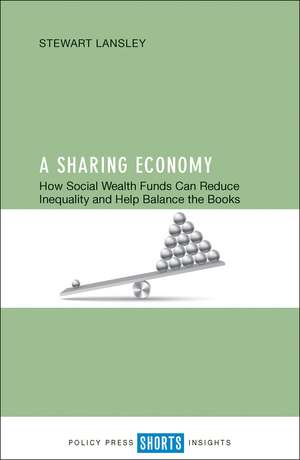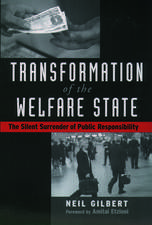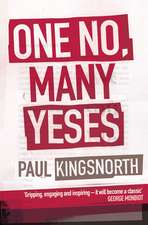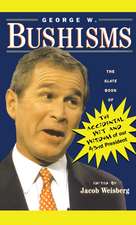A Sharing Economy: How Social Wealth Funds Can Reduce Inequality and Help Balance the Books
Autor Stewart Lansleyen Limba Engleză Paperback – 15 mar 2016
Could social wealth funds reduce inequality and tackle austerity? A Sharing Economy proposes radical new ways to close the growing income gap and spread social opportunities. Drawing on international examples, Stewart Lansley argues that mobilizing the huge financial potential of UK public assets could pay for a pioneering new social wealth fund. By strengthening the social assets base, such a fund would boost economic and social investment and simultaneously strengthen public finances. Social wealth funds could also, he argues, ensure that more of the gains from economic activity are shared by all rather than consumed by a powerful few, as well as possibly win widespread public and political support. Offering a powerful antidote to the rhetoric and policies of austerity, this is a fascinating, topical contribution to current debates about social economics.
Preț: 122.77 lei
Nou
Puncte Express: 184
Preț estimativ în valută:
23.49€ • 25.60$ • 19.80£
23.49€ • 25.60$ • 19.80£
Carte disponibilă
Livrare economică 02-16 aprilie
Preluare comenzi: 021 569.72.76
Specificații
ISBN-13: 9781447331438
ISBN-10: 1447331435
Pagini: 112
Dimensiuni: 127 x 197 x 10 mm
Greutate: 0.27 kg
Editura: Bristol University Press
Colecția Policy Press
ISBN-10: 1447331435
Pagini: 112
Dimensiuni: 127 x 197 x 10 mm
Greutate: 0.27 kg
Editura: Bristol University Press
Colecția Policy Press
Notă biografică
Stewart Lansley is a visiting fellow at the Townsend Centre for International Poverty Research, University of Bristol. He is the author of The Cost of Inequality: Why Economic Equality is Essential for Future Growth and coauthor of Breadline Britain: The Rise of Mass Poverty, among other books.
Cuprins
About the author
Acknowledgements
Preface
1. ‘All-out assault’: inequality and corporate capitalism
2. Too big to fail: the dominance of private capital
3. Fair shares: social wealth funds and the sharing of national wealth
4. The international experience: what can we learn?
5. How to pay for the UK’s first social wealth fund
6. Power cut: the dilution of capital ownership and a citizen’s payment
7. An income for all: can a citizen’s income work?
8. From the drawing board to reality
9. Towards a sharing economy
Notes
Index
Acknowledgements
Preface
1. ‘All-out assault’: inequality and corporate capitalism
2. Too big to fail: the dominance of private capital
3. Fair shares: social wealth funds and the sharing of national wealth
4. The international experience: what can we learn?
5. How to pay for the UK’s first social wealth fund
6. Power cut: the dilution of capital ownership and a citizen’s payment
7. An income for all: can a citizen’s income work?
8. From the drawing board to reality
9. Towards a sharing economy
Notes
Index
Recenzii
“Short book, big ideas: academic and ex-journalist Lansley on why Britain’s an outlier, and not in a good way; why the sharing economy is more than just Uber; why the erosion of unionisation and rise of rent-seeking in the wake of the 1970s shift ‘from labour to capital and from wages to profits’ has been such bad news for most of us; and—look, there’s Mariana Mazzucato and John McDonnell nodding in agreement—why we must mobilise the financial potential of 'what remains of the family silver,' ie, national assets, for a social wealth fund that can boost economic and social investment and improve public finances.”
"A particularly promising idea . . . convincingly laid out."
“The case the book makes for the nation managing its assets properly and with a view to financial and social sustainability is very welcome.”
“Effectively it is an action plan that could potentially fit around the famous phrase of Martin Luther King: ‘before you finish eating breakfast in the morning, you’ve depended on more than half the world.’”
“Both the author and the publisher are to be congratulated on a timely and well-argued book that brings together arguments for social wealth funds and for a Citizen’s Income, and that suggests an important connection between them.”
“A Sharing Economy deserves to be taken very seriously, because in proposing social wealth funds, Lansley offers us a serious idea for seriously troubling times—the left has far too few of these at the moment.”
“Path-breaking. Provides a different model of how economic activity can be financed and how the resulting prosperity should be shared, together making a new lens through which to tackle inequality.”
“Everyone agrees capitalism needs reform. But how? Lansley argues powerfully and persuasively that a new economic model based on a sharing economy is both possible and increasingly urgent.”
“Bold and exciting, A Sharing Economy deserves wide public discussion, scrutiny, and debate.”















